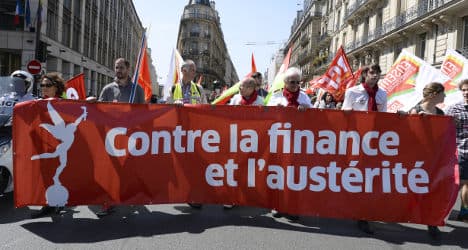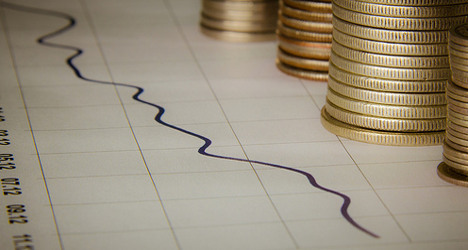Budget 2015: €21 billion savings plus tax cuts

France's eagerly awaited 2015 budget was revealed on Wednesday which includes €21 billion of savings, a hike in the tax on diesel fuel as well as income tax cuts. The country's deficit would be brought in line with EU rules by 2017.
The budget, which was presented by the country's finance minister Michel Sapin to the cabinet on Wednesday, details €21 billion of savings to be made through cuts in state spending and the social security budget as well as reduced grants to local authorities.
In all €50 billion worth of savings are to be made over the next three years."We have a plan and we're sticking to it," Sapin told reporters adding that the savings were "unprecedented".
To make up for the changes made to the controversial "ecotax" on heavy goods vehicles the government plans to raise the tax on diesel fuel by two centimes per litre.
Sapin said he would recoup a further four billion euros in French public asset sales to pay off debt.
Significantly the government has stuck to its promise made this summer to reduce income taxes in a bid to boost the spending power of the country's more worse-off.
"The French people will not be asked to make additional efforts because, although the government is aware of the seriousness of the budgetary situation ... it refuses to impose austerity," said Sapin.
The lowest tax bracket will be taken away next year meaning the threshold for paying income tax will now kick in at €10,000.
Measures are also included in the budget to reduce labour costs for companies as was laid out in president François Hollande's "Responsibility Pact" which he hopes will help boost recruitment and cut unemployment.
The budget must be approved by parliament at a later date.
The budget also included forecasts for the French economy over the coming years, notably in the key area of the budget deficit which Sapin forecast would scrape below the European Union ceiling by 2017 - two years later than initially agreed with the EU.
SEE ALSO: French public debt passes €2,000,000,000,000 mark

Michel Sapin told reporters that the deficit would be 2.8 percent of gross domestic output in 2017, just below the EU's three-percent ceiling.
France had promised Brussels it would get below the three percent limit next year but in a dramatic about-turn earlier this month, pushed back this commitment by two years.
We have taken the decision to adapt the pace of deficit reduction to the economic situation of the country,” Finance Minister Michel Sapin told a news conference.
“Our economic policy is not changing, but the deficit will be reduced more slowly than planned due to economic circumstances - very weak growth and very weak inflation.”
Sapin also forecast a very gradual recovery for the crisis-hit French economy, which he said would reach a level of two percent growth only in 2018.
The economy is projected to grow by only 0.4 percent this year, recovering progressively to 1.0 percent in 2015, 1.7 percent in 2016 and 1.9 percent in 2017.
The minister said the economy would grow by two percent in 2018 and 2019.
These forecasts are a far cry from those made by President François Hollande during his presidential campaign in 2012. Back then then the president in waiting predicted growth of 1.7 percent in 2015 and a budget deficit of just 1.6 percent in 2016.
France is struggling through a deep economic crisis, with zero growth in the previous two quarters and sky-high unemployment.
European Union rules say that debt must not exceed 60 percent of GDP, or be falling significantly towards this ratio.
Sapin predicted that public debt would peak in 2016 at 98 percent of GDP, before dropping back.
The European Commission, which oversees European countries' budgets, is scheduled to deliver its judgement on France's economic woes next month.
In a twist of fate, it will almost certainly be former French finance minister Pierre Moscovici - appointed EU economic affairs commissioner - who will have to decide on the consequences for France for breaking the rules.
Comments
See Also
The budget, which was presented by the country's finance minister Michel Sapin to the cabinet on Wednesday, details €21 billion of savings to be made through cuts in state spending and the social security budget as well as reduced grants to local authorities.
In all €50 billion worth of savings are to be made over the next three years."We have a plan and we're sticking to it," Sapin told reporters adding that the savings were "unprecedented".
To make up for the changes made to the controversial "ecotax" on heavy goods vehicles the government plans to raise the tax on diesel fuel by two centimes per litre.
Sapin said he would recoup a further four billion euros in French public asset sales to pay off debt.
Significantly the government has stuck to its promise made this summer to reduce income taxes in a bid to boost the spending power of the country's more worse-off.
"The French people will not be asked to make additional efforts because, although the government is aware of the seriousness of the budgetary situation ... it refuses to impose austerity," said Sapin.
The lowest tax bracket will be taken away next year meaning the threshold for paying income tax will now kick in at €10,000.
Measures are also included in the budget to reduce labour costs for companies as was laid out in president François Hollande's "Responsibility Pact" which he hopes will help boost recruitment and cut unemployment.
The budget must be approved by parliament at a later date.
The budget also included forecasts for the French economy over the coming years, notably in the key area of the budget deficit which Sapin forecast would scrape below the European Union ceiling by 2017 - two years later than initially agreed with the EU.
SEE ALSO: French public debt passes €2,000,000,000,000 mark

Michel Sapin told reporters that the deficit would be 2.8 percent of gross domestic output in 2017, just below the EU's three-percent ceiling.
France had promised Brussels it would get below the three percent limit next year but in a dramatic about-turn earlier this month, pushed back this commitment by two years.
We have taken the decision to adapt the pace of deficit reduction to the economic situation of the country,” Finance Minister Michel Sapin told a news conference.
“Our economic policy is not changing, but the deficit will be reduced more slowly than planned due to economic circumstances - very weak growth and very weak inflation.”
Sapin also forecast a very gradual recovery for the crisis-hit French economy, which he said would reach a level of two percent growth only in 2018.
The economy is projected to grow by only 0.4 percent this year, recovering progressively to 1.0 percent in 2015, 1.7 percent in 2016 and 1.9 percent in 2017.
The minister said the economy would grow by two percent in 2018 and 2019.
These forecasts are a far cry from those made by President François Hollande during his presidential campaign in 2012. Back then then the president in waiting predicted growth of 1.7 percent in 2015 and a budget deficit of just 1.6 percent in 2016.
France is struggling through a deep economic crisis, with zero growth in the previous two quarters and sky-high unemployment.
European Union rules say that debt must not exceed 60 percent of GDP, or be falling significantly towards this ratio.
Sapin predicted that public debt would peak in 2016 at 98 percent of GDP, before dropping back.
The European Commission, which oversees European countries' budgets, is scheduled to deliver its judgement on France's economic woes next month.
In a twist of fate, it will almost certainly be former French finance minister Pierre Moscovici - appointed EU economic affairs commissioner - who will have to decide on the consequences for France for breaking the rules.
Join the conversation in our comments section below. Share your own views and experience and if you have a question or suggestion for our journalists then email us at [email protected].
Please keep comments civil, constructive and on topic – and make sure to read our terms of use before getting involved.
Please log in here to leave a comment.